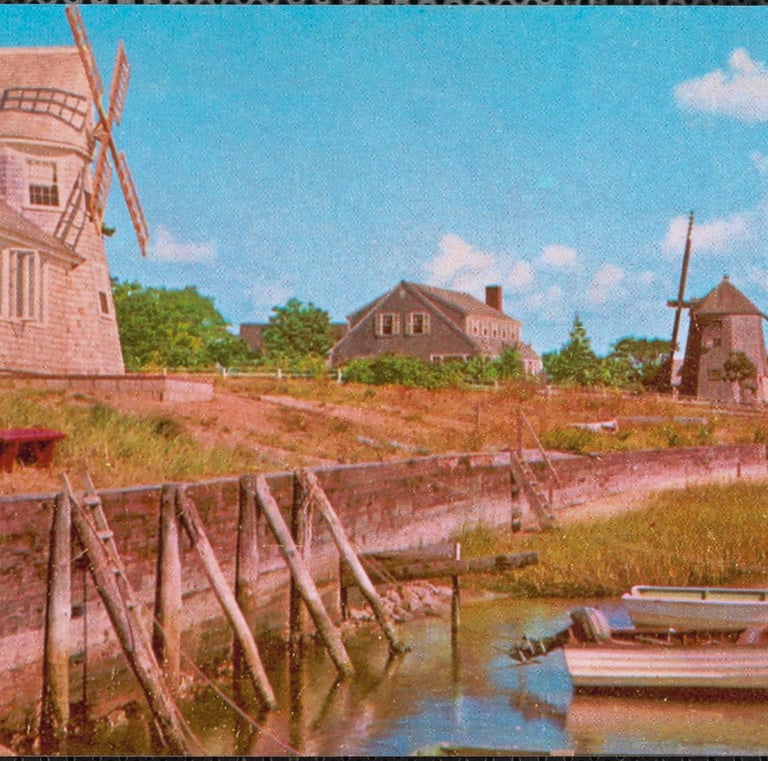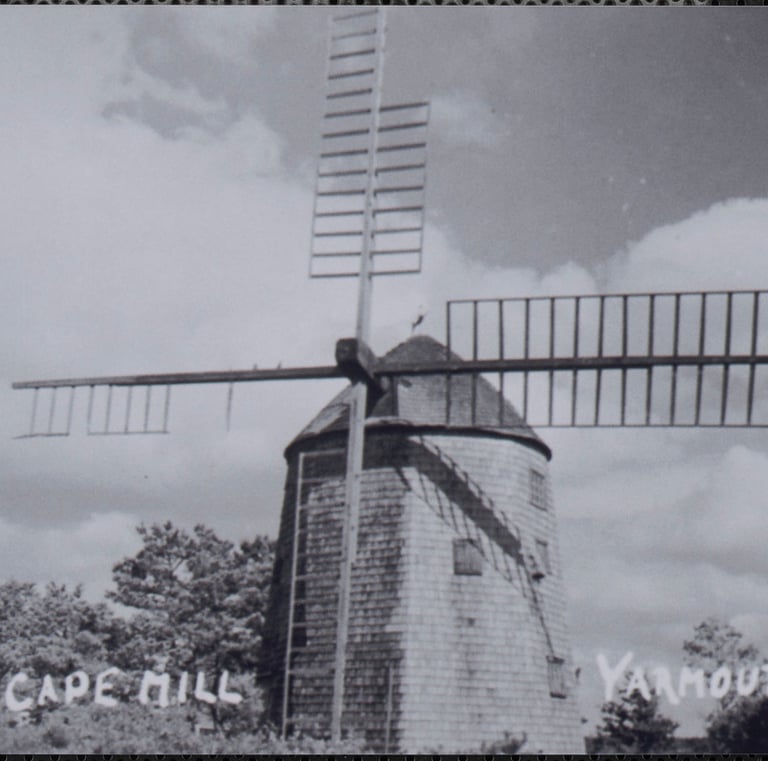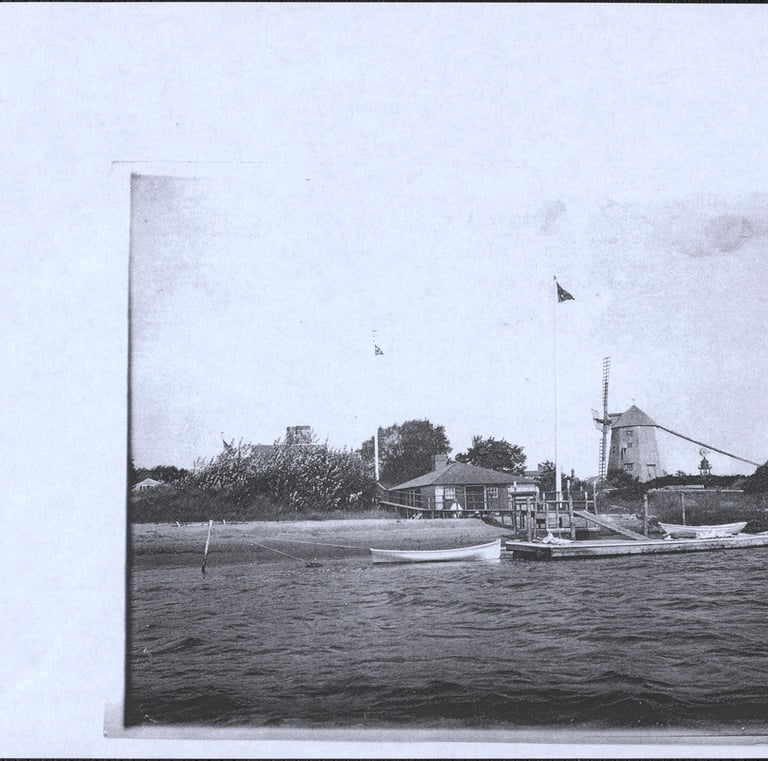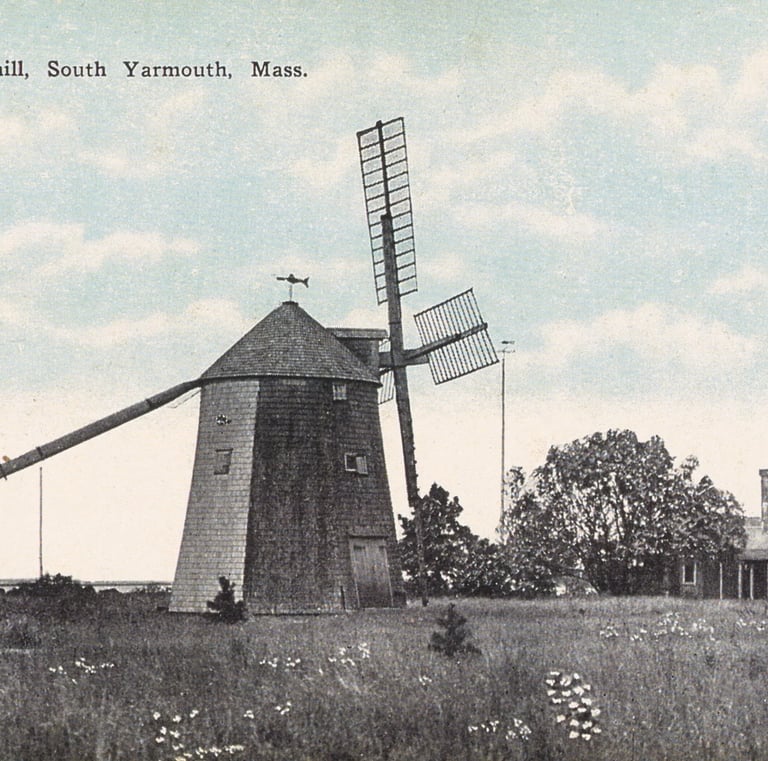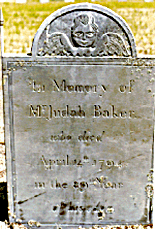Uncover the Baker Family Legacy
Discover the extensive genealogy and historical background of the Baker family from Cape Cod, MA, during the 1700s, and find related resources to enhance your knowledge.


As one of the original families settling what is now South Yarmouth/Dennis, the Baker Family built our current house in 1712. That house has remained unchanged for over 300 years with the exception of the new kitchen, dining room and laundry room added after a fire in the 1990’s. The existing Barn has, over the years, undergone numerous changes and additions. In 2015 the Barn was completely renovated. Our goal was to preserve as much of the original structure and timbers as possible. We also recycled barn materials as handrails, wood trim, table tops and bench seating. The Baker Family kept numerous records related to the family and the property including the purchase of construction materials and salvage ship timbers. These records are now preserved at Harvard University.
Francis Baker
Francis Baker was born in Hertforshire, England in 1611. When he was 24 years old, he came to America on the ship named the “Planter”, landing in Boston April 2, 1635. He was described as a tailor and brought with him a certificate from the minister at Great St. Albans, Herfordshire, England, his last place of residence.
His parents are not actually known but it is thought to be one of two possibilities. First it is reported in the Colonial records that he was thought to be a brother of Nicholas and Nathaniel Baker. It is possible that he was a son of John and Margery Madestard Baker of Herfordshire, England. It is also possible that he is the son of Thomas Baker who was christened 7 July 1612 at St James Clerkenwell, London. The date agrees exactly. Thomas’s wife was Francis Ingram. They were married at St James Clerkenwell, 24 Aug 1592.
On June 1, 1641, Francis Baker, now working as a cooper ( a maker or repairer of wooden barrels) was admitted to dwell at Yarmouth, but was permitted to occupy or own lands that were not assigned to others without their consent.” (Plymouth Colony Records, 2:17). Under this authority, he settled near Follens Pond, at the head of Bass River, in what was then Nobesussett Territory but now within the bounds of Dennis. At that time, the first white
man’s house at Nobseussett was less than two years old.
He was married June 17, 1641, to Isabel Twining of Yarmouth, (Ply. Col. Ct. Rec. 2:19), daughter of William Twining. This is the first marriage of record at Yarmouth, it lasted 55 years. Their first child was born in Boston in 1642. They moved to Yarmouth, Barnstable County, Massachuesetts, before the second was born in 1645.
He became an influential man in the colony. June 7, 1648, he was appointed surveyor of Highways in Yarmouth (Ply. Col. Rec. 2:124). In 1656 he was member of the jury. In 1658 he had a grant of 10 acres of land in Eastham, lying near to William Twining, his father in law.
In 1659 Francis and Isabel were still living on this land but soon sold it to William Twining Jr. and returned to their Yarmouth farm. Here he spent the remainder of his life. He died in Yarmouth July 23, 1696, aged 85, probably the last of the first settlers of Yarmouth/Dennis. His will, dated Mar. 4, 1692-93 was probated Dec. 8, 1696 (Barnstable Probate Record 2:30). His widow died May 16, 1706. In his will of March 4, 1693, he mentions all of his children except Samuel, leaving it to be supposed that they were (except Samuel) all alive at that date.
The old house by the River where Francis and Isabel Baker reared their family of eight children has long since disappeared. The only dwelling now standing in that vicinity was built but a few years ago. It is believed to be on the former site of the Baker homestead. Numbers of old nails found in the ground indicate the spot where a blacksmith shop once stood, The Yarmouth town records describe Francis as a blacksmith, a cooper and a surveyor. One of his sons built our current home on High Bank around 1712.
Many of the early Bakers, as well as later ones, sleep in the old graveyard near the South Dennis depot, but the exact burial place of most of the early Bakers is a matter of conjecture. On an elevation near the old home site is an old burying-ground, surrounded by woods and overgrown with shrubbery, but the names on the few stones standing there are associated with the early Quaker families who settled in the neighborhood. About 1714, the first Friends Meeting House was built near this spot. We are told that Francis Baker was not a Quaker ; (Swift’s History of Old Yarmouth); how he regarded those of the Quaker faith or how they regarded him we do not know, but one of the witnesses to his will was evidently a Quaker neighbor; his grandson, Samuel, was publicly censured for his leniency toward the sect (Swift’s History of Old Yarmouth) and others of his grandchildren married among them. And it may be that Francis Baker and his wife found resting place on the hill with their gentle neighbors, the Friends. (Possible buried in graveyard near So. Dennis R.R. Station).
Within a few miles from where the first Bakers settled, – on both sides of Bass River and throughout the Cape, – still reside many of that name. One branch of the family early removed to Maine and another to Connecticut – near Tolland – while others are found in nearly every State in the Union.
Judah Baker
Judah Baker built his windmill in 1791 at Grand Cove in North Dennis. Judah built his windmill with a cone-shaped roof and two dormers. One dormer was for the mast and power shaft and the other dormer was for the tail pole. Judah Baker’s son Peter sold his father’s mill to Captain Freeman Crowellwho moved the mill to East Dennis. The mill functioned until 1863 at Winkle Point in East Dennis. Captain Braddock Matthews bought the mill in 1866 and moved it to South Yarmouth “Lower Village” now known as Bass River. Seth Baker bought the windmill from Captain Matthews in 1875. Seth operated the windmill until his death in 1891. Seth’s son Joseph sold the mill in 1893 to William Stone. The mill no longer operated. A storm in 1916 damaged the mill. Charles Henry Davis assumed the guardianship of the mill and he moved it down the street to its present location. A deal was made in 1953 where the Town of Yarmouth took over the responsibility of the windmill.
Frothingham, a writer for a The Register describes how the roof of the mill was turned to face the wind: “The operation of the mill must have been fascinating. The whole roof and top beam and huge cog wheel were on rollers and could be rotated to head the sails into the wind. A long tail piece opposite the sails extended down from the roof to a wheel on the ground and this ran around the mill on a wooden track. It could be hauled by a horse, or even pushed by a number of men. The sails as we see them today are merely the slats on which canvas sails were spread and fastened to catch the wind.” The Judah Baker Windmill was completely rebuilt in 1973. The interior structure, the shake shingles, the copula, the mast and the tail pole were all either rebuilt, replaced or restored. The mill was authentically rebuilt and restored using hand-hewn lumber where possible. The interior has the original mechanical equipment that the wind powered and stones that ground the grain.
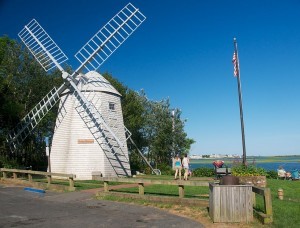

Discover the Rich History of Cape Cod's Iconic Windmills
A History of Yarmouth's Windmill's
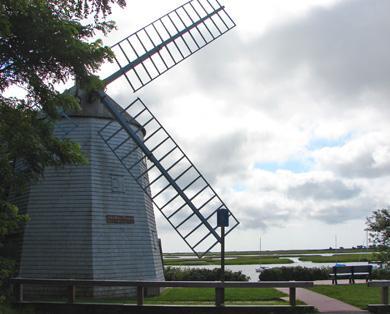

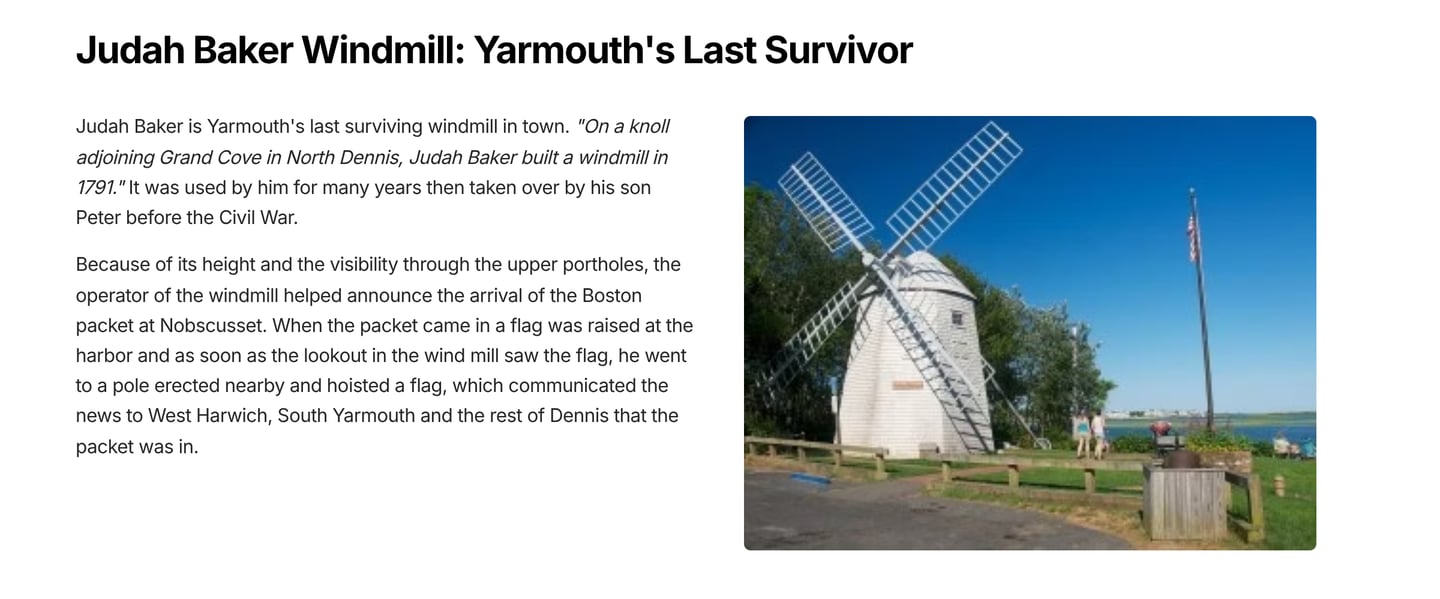

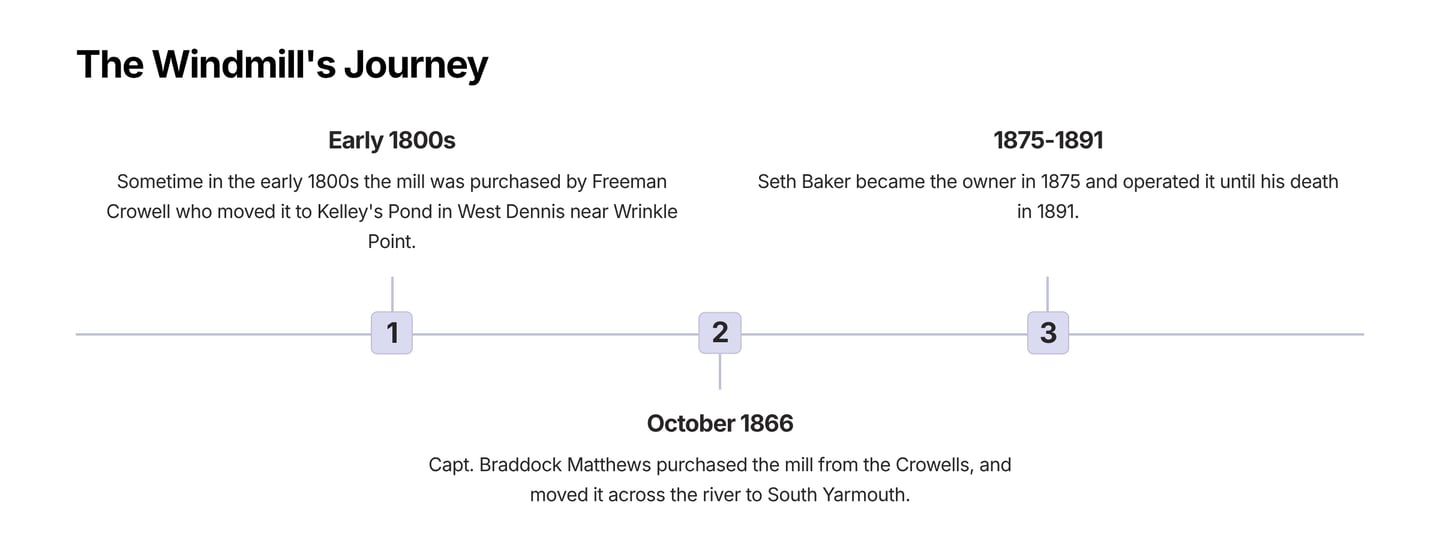

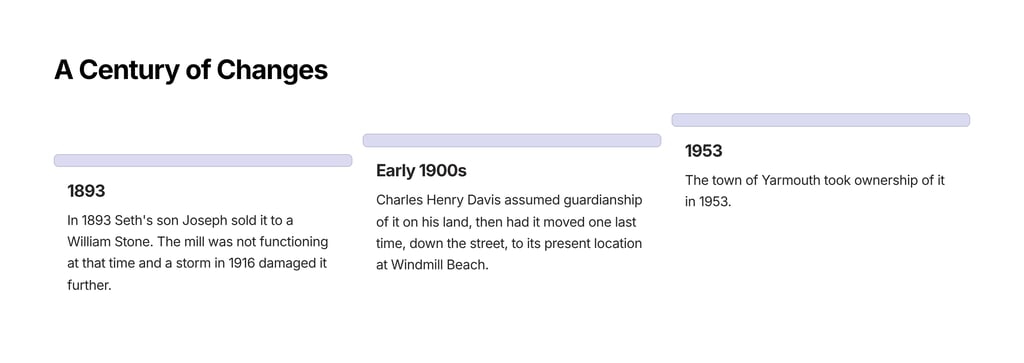

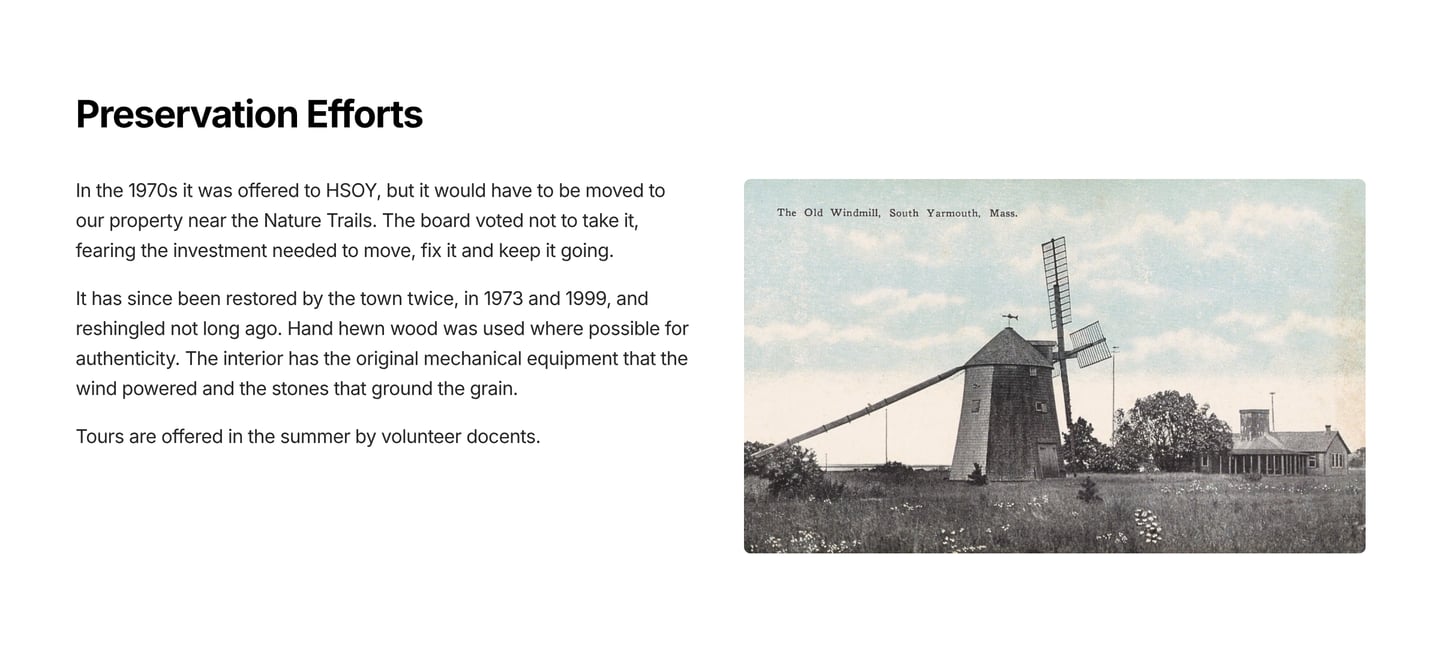

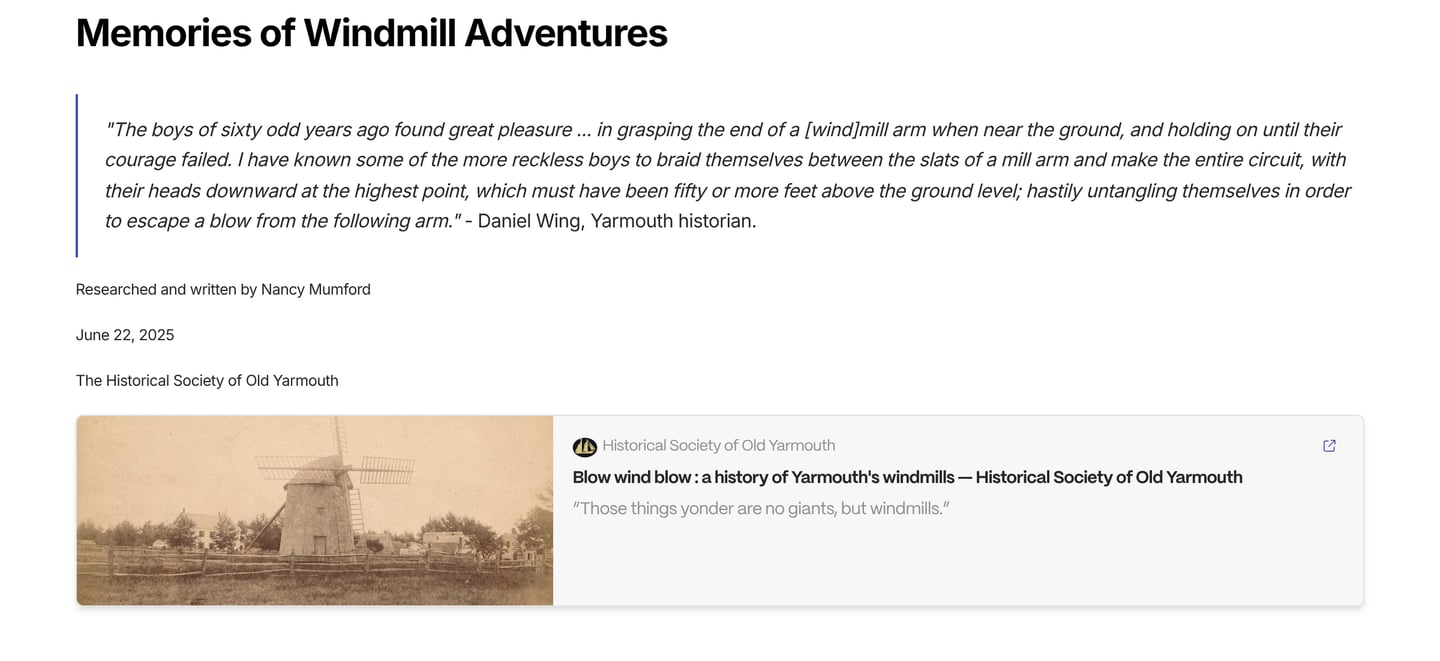

The Baker Family
Explore the genealogy and history of the Baker family.


Francis and Isabel Baker


Baker Family Records




The Green Books
Genealogy Research Tools
→
→
→
→
Explore
History in the Making on Cape Cod
Discover
345 Highbank Rd. South Yarmouth, MA
www.HighbankPartners.com © 2025. All rights reserved.



